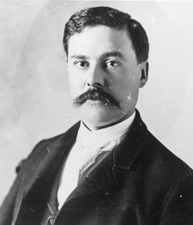
While many mainstream Mormons are uncomfortable being associated with polygamy and polygamists, the Browns of TLC’s Sister Wives similarly do not want to be associated with all polygamists.
(The Browns call members of the Church of Jesus Christ of Latter-day Saints based in Salt Lake City “mainstream” Mormons)
“We were tired of Warren Jeffs being the poster child of plural marriage,” Janelle Brown told me in an interview.
Warren Jeffs is the former head of the Fundamentalist Church of Jesus Christ of Latter-Day Saints who was convicted of child sexual assault for arranging child brides for much older men. The arrest of Jeffs and his public trail received national attention.
As one of the most public polygamist families, Meri, Janelle, Christine, Robyn, and Kody Brown are presenting a picture of polygamists that is different from that of Jeffs.
Like Brady Williams of TLC’s My Five Wives did in an earlier statement to Approaching Justice, Kody was very specific with me in our interview as he condemned practices sometimes associated with polygamists like child brides, arranged marriages, and authoritarian religious leadership.
“We come from a line of polygamy that does not have authoritarian religious rule or child brides,” Kody said.
That is not the kind of polygamy that they practice or the kind of family that they are. One of the things they have enjoyed about being on TLC, is the opportunity to show their perspective.
Winning in Court
In many ways they have succeeded. Not only with the publicly from the show, but with their recent victory in a federal court. In a ruling handed down December 14, 2013, U.S. District Judge Clark Waddoups struck down the section of the Utah bigamy law which had been used to target polygamists.
The family cried when they found out about the ruling, Meri told me.
“It was also a time of reflection,” Kody said of the time after the ruling. “So many families lived and died in obscurity.”

The ruling in the Brown v. Buhman will likely be appealed by the state of Utah (the Utah Attorney Generals office told me this morning there might be news today about the next step), but the ruling by Judge Waddoup is the legal ends the Browns are seeking.
“We have never been interested in having legally recognized plural marriage,” Kody told me. “We just the right to organize our family as we want.”
“What we want is for everybody to have that choice and happiness,” Janelle said.
In many ways, polygamous relationships, let alone polygamous marriage causes a range of complications for a legal and policy framework which assumes a two spouse household. For all the uproar about same-sex marriage, it is not as complicated from a policy and tax perspective.
“Can you imagine what a tax nightmare that woud be,” Robyn said with a laugh about the prospect of legally recognize polygamy.
By starring in a reality show, the Brown left that obscurity behind. This also attracted the attention Utah County Attorney Jeff R. Buhman. For the most part polygamists are ignored, as long as they stay in the shadows.
In leaving those shadows, the Browns were charged with violating the bigamy laws that had been constructed in Utah to target polygamists. However, many of the problems that arise amongst polygamist groups like those of Warren Jeffs are rooted in the secretive nature which polygamists have been forced to live in because of the persecution by the state.
I do not say that as a defense of Jeffs, for whom there is no defense, but instead to point out that authoritarian leaders like Jeffs are able to gain greater control and influence in the shadows and far corners of society.
In the Public Eye
The Browns are happy to share with the world that they are a different type of polygamist family from the stereotype of Mormon polygamy.
“I love people knowing we are different,” Christine to me. “Doing the show portrays us as less of a threat.”
“People are able to see us a family,” Robyn added.
And the Browns insist they are not the outliers. Most polygamists are like them. They have regular hair-styles. They dress normal.
“The majority of plural marriage families are not wearing prairie dresses,” Christine emphasized.
The Browns feel that they have removed some the “shame” and “stigma” that has come from being a “plural family.”
But it has come with some costs.
One was the prosecution that eventually led to the recent court victory. But before that victory, which could still be overturned, they fled their home in Utah for Las Vegas. They admit that they feel more welcome in Las Vegas where being different…is not so different.
The other was a loss of privacy and anonymity.
“Sometimes I really miss going into the groceries store and being low key,” Christine told me.
But this is to be expected when you agree to be featured on a national reality television show. And the loss of anonymity has not been a particularly bad thing.
“Everywhere I go I am constantly being watched and that has made me a better person,” said Christine.
“We sacrificed anonymity for tolerance,” Kody commented reflectively.
In my own experience watching the Browns on TLC’s Sister Wives over the years, I can honestly say that my attitude towards polygamist families has changed as I have gotten to know their family in a virtual sense through their show.
My brief conversation with them only reinforced my sense of them as a kind, thoughtful, and sincere group of people. While reality television can never be completely real, Meri, Janelle, Christine, Robyn, and Kody Brown are real people. The are real good people.











